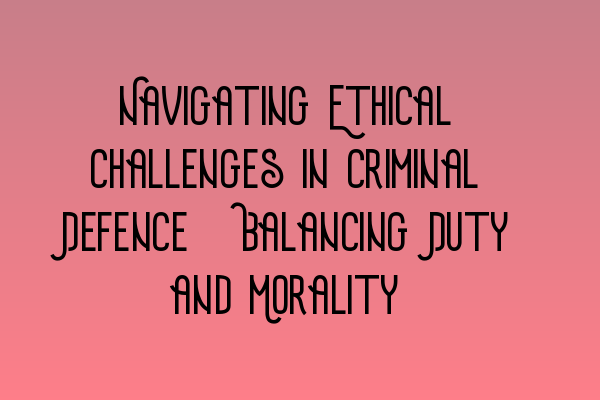Navigating Ethical Challenges in Criminal Defence: Balancing Duty and Morality
When it comes to criminal defence, lawyers often find themselves facing significant ethical challenges. The nature of their work requires them to defend individuals accused of crimes, regardless of guilt or innocence. This duty to provide legal representation can sometimes conflict with personal moral beliefs, creating a delicate balance to navigate.
As a criminal defence solicitor at SQE Criminal Law & Practice Law UK, I understand the complexities and moral dilemmas that can arise in this field. In this blog post, we will explore the various ethical challenges faced by criminal defence lawyers and consider how they can effectively balance their duty to their clients with their own personal morality.
The Duty to Diligently Represent Clients
One of the most fundamental ethical principles for criminal defence lawyers is the duty to diligently represent their clients. This duty requires lawyers to provide competent legal advice and representation, regardless of personal feelings about the client’s innocence or the seriousness of the alleged crime.
However, this duty can raise ethical challenges when a lawyer strongly believes that their client may be guilty or has committed a morally abhorrent act. It may be difficult to reconcile the responsibility to vigorously defend the client with personal moral beliefs. In such cases, it is crucial for lawyers to remember that everyone is entitled to legal representation, and to set aside personal judgments to fulfill their duty to the best of their abilities.
Confidentiality and Truthfulness
Another ethical challenge in criminal defence involves the duty of confidentiality and truthfulness. Lawyers have an obligation to maintain client confidentiality and preserve the attorney-client privilege. This means that they must keep all information disclosed by the client confidential, even if it contradicts the lawyer’s personal beliefs or could potentially incriminate the client.
Similarly, lawyers must navigate the delicate balance between truthfulness and zealous advocacy. While lawyers have a duty to present the client’s case in the most favorable light, they cannot knowingly make false statements or mislead the court. This requires lawyers to carefully craft their arguments and present alternative interpretations of evidence without crossing the line into dishonesty.
Personal Moral Objections
There may be instances where a criminal defence lawyer personally objects to the alleged crime committed by their client. This can pose a significant moral dilemma, as lawyers may question the morality of their own actions in defending someone they believe to be guilty.
In such situations, it is crucial for lawyers to remember the importance of due process and the presumption of innocence. Every accused individual deserves a fair trial and proper legal representation. By providing a robust defence, lawyers contribute to upholding the principles of justice and ensuring that the legal system functions effectively.
Seeking Guidance and Support
Navigating ethical challenges in criminal defence can be emotionally and mentally draining for lawyers. It is essential for legal professionals to seek guidance and support from their peers, mentors, or professional organizations. These resources can provide valuable insights, advice, and a safe space to discuss the ethical dilemmas faced in their practice.
Additionally, continuing professional development and further education can help lawyers stay updated on ethical guidelines, legal precedents, and emerging issues in criminal law. SQE 1 Practice Exam Questions and SQE 1 Practice Mocks FLK1 FLK2 are valuable resources that can aid in preparation for the SQE exams and ensure a solid foundation in criminal law practice.
Conclusion
As criminal defence lawyers, it is our duty to diligently represent our clients while navigating the ethical challenges that arise. Balancing duty and personal morality requires a careful examination of the principles of justice, due process, and the importance of providing legal representation to all individuals, regardless of guilt or innocence.
By understanding and embracing these principles, criminal defence lawyers can effectively navigate the ethical challenges they face, ensuring the preservation of justice and upholding the legal profession’s integrity.
For lawyers looking to enhance their knowledge and skills in criminal law practice, SQE 2 Preparation Courses and SQE 1 Preparation Courses are valuable resources to consider. Stay updated on the SRA SQE Exam Dates for important milestones in your legal career.
